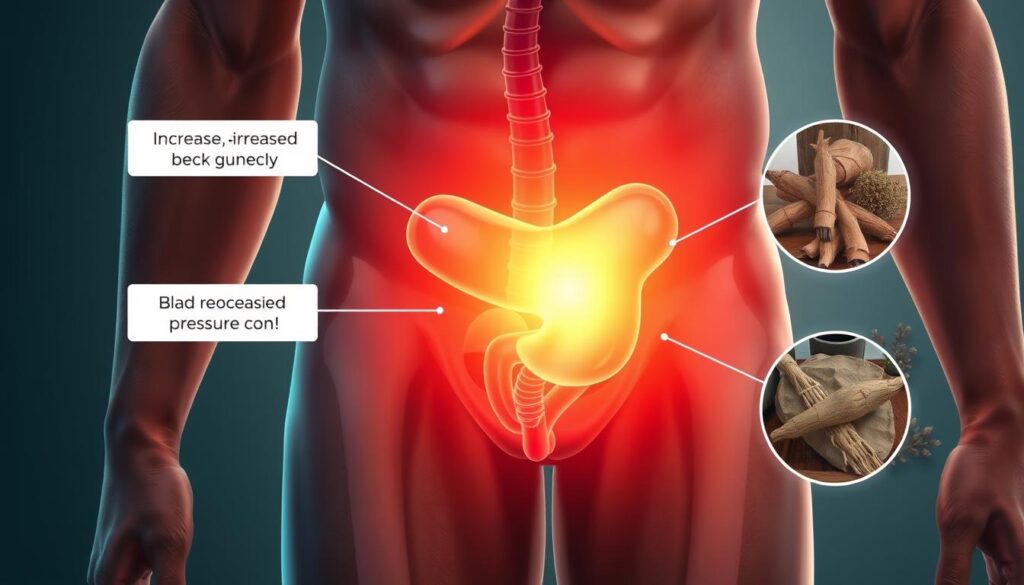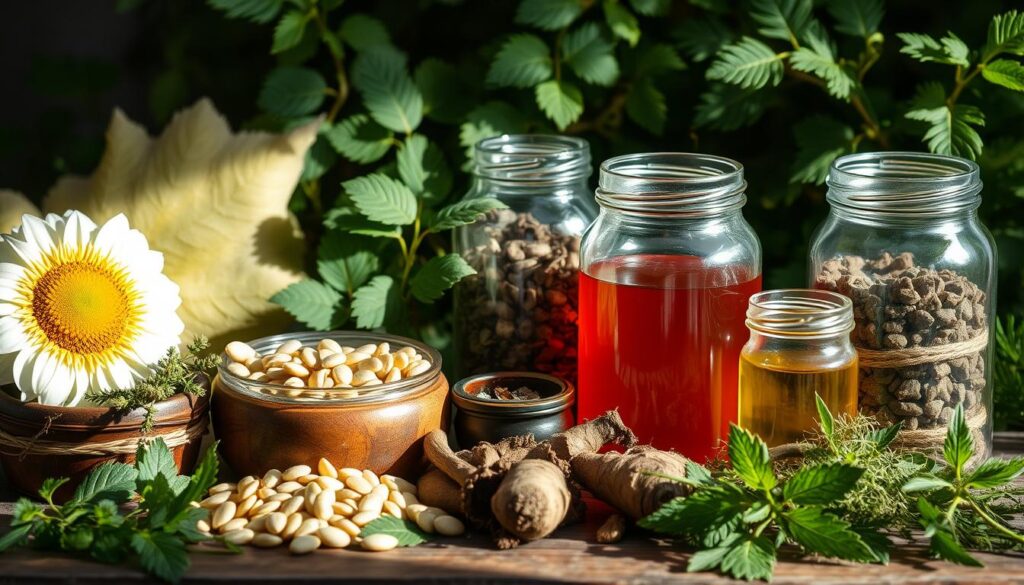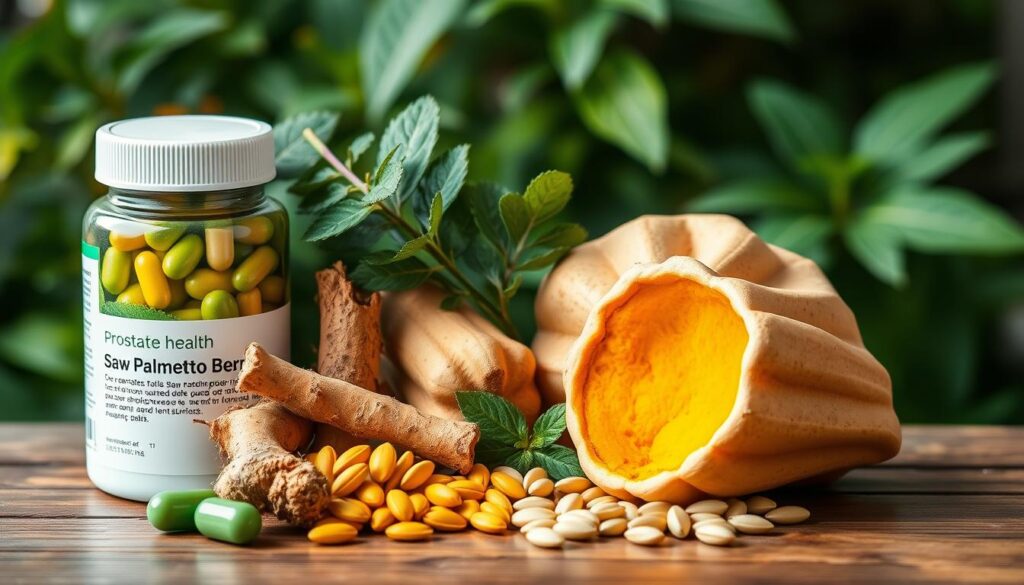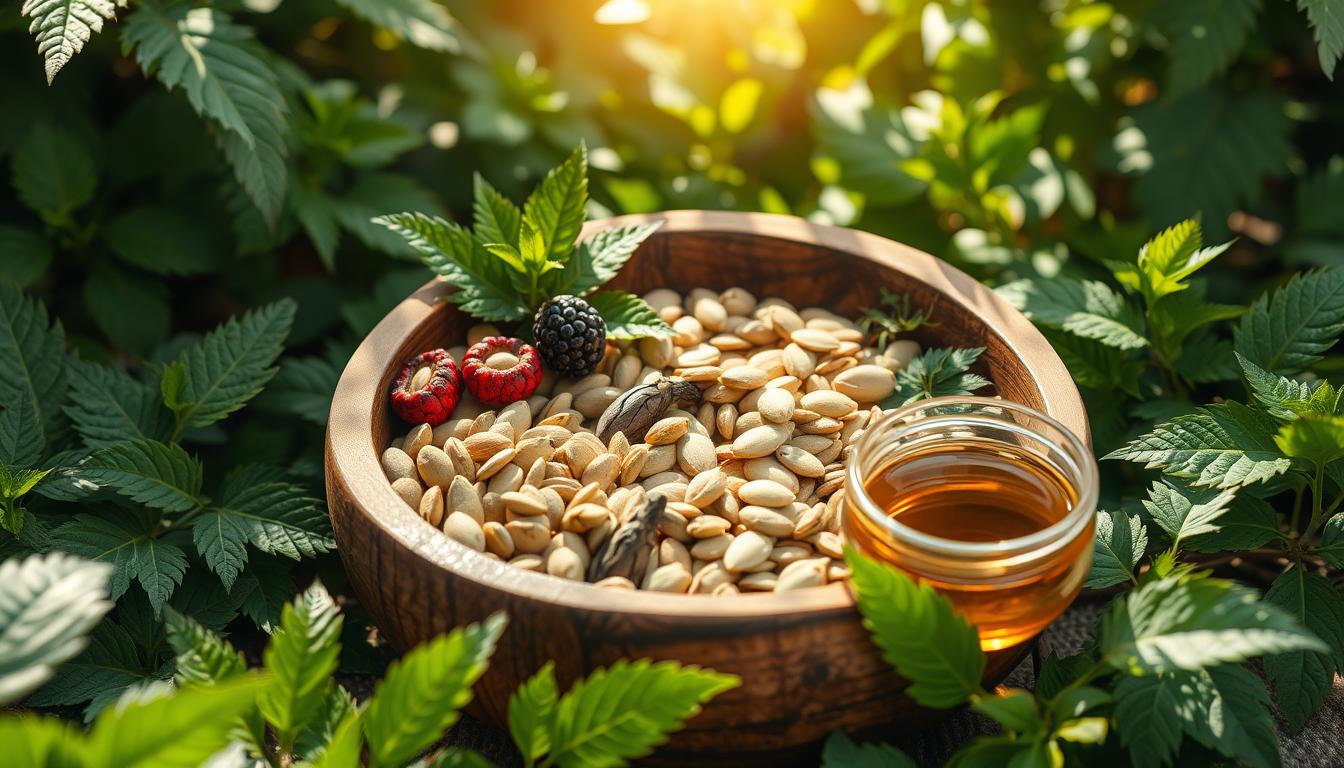As men age, the prostate gland often undergoes a natural enlargement, a condition known as benign prostatic hyperplasia (BPH). In fact, up to 50% of men aged 51-60 and an astounding 90% of men over 80 may experience an enlarged prostate. While this is a common part of the aging process, the resulting symptoms, such as urinary urgency, frequency, and difficulty emptying the bladder, can significantly impact a man’s quality of life.
Fortunately, there are various treatment options available, including natural remedies that can help manage the symptoms of an enlarged prostate. In this article, we’ll explore the potential of these simple, yet effective, solutions to provide relief and support prostate health.
Key Takeaways:
- Benign prostatic hyperplasia (BPH) is a common condition affecting up to 50% of men aged 51-60 and 90% of men over 80
- Symptoms of an enlarged prostate include urinary urgency, frequency, and difficulty emptying the bladder
- Natural remedies, such as herbal supplements and dietary changes, can help manage BPH symptoms and support prostate health
- Lifestyle factors like stress management, exercise, and a healthy diet play a crucial role in maintaining prostate function
- While some natural remedies show promise, it’s important to consult with a healthcare provider before starting any new treatment
Understanding Enlarged Prostate (BPH) and Its Impact
Benign prostatic hyperplasia (BPH), commonly known as an enlarged prostate, is a prevalent condition affecting men as they age. According to experts, BPH affects 5% to 6% of men aged 40 to 64, and the prevalence increases significantly to 29% to 33% for those 65 and older. This age-related phenomenon is the most common prostate problem men face after the age of 50.
Common Symptoms and Warning Signs
The symptoms of an enlarged prostate can vary in severity, but often include frequent urination, difficulty starting or stopping the urine stream, a feeling of incomplete bladder emptying, and even urinary leakage or infections. These urinary issues can have a significant impact on a man’s quality of life, disrupting sleep patterns and daily activities.
Risk Factors and Age-Related Changes
While the exact causes of BPH are not fully understood, certain risk factors have been identified. Age is the primary risk factor, as the prostate gland typically begins to enlarge around the age of 40 and continues to grow throughout a man’s life. Hormonal changes and family history may also contribute to the development of an enlarged prostate.
How BPH Affects Quality of Life
The impact of an enlarged prostate can be far-reaching, affecting a man’s sleep, daily routines, and overall well-being. Frequent nighttime urination can disrupt sleep patterns, leading to fatigue and reduced productivity. The inability to fully empty the bladder can also increase the risk of urinary tract infections, further compromising a person’s quality of life.
While BPH is not linked to prostate cancer, it is essential to seek medical attention for proper diagnosis and treatment. Fortunately, there are various treatment options, including lifestyle changes, medications, and minimally invasive procedures, that can help manage the symptoms and improve overall prostate health.

| Symptom | Impact on Quality of Life |
|---|---|
| Frequent urination | Disrupts sleep, interferes with daily activities |
| Difficulty starting/stopping urine stream | Causes frustration and embarrassment |
| Incomplete bladder emptying | Increases risk of urinary tract infections |
| Urinary leakage | Affects confidence and social interactions |
Natural Remedies for Enlarged Prostate: Herbal Solutions
For men seeking natural remedies to manage an enlarged prostate, or benign prostatic hyperplasia (BPH), several herbal extracts have shown promising results. These natural BPH remedies and herbal treatments for prostate health can provide relief without the potential side effects of prescription medications.
One of the most extensively studied natural ingredients for BPH is saw palmetto. This herb has been noted in a 2021 study to provide effective symptom relief for moderate to severe lower urinary tract symptoms and BPH, even compared to the medication Flomax (tamsulosin). Saw palmetto may help by inhibiting 5-alpha-reductase, an enzyme that converts testosterone into dihydrotestosterone (DHT), which can contribute to prostate enlargement.
Another botanical with potential benefits for prostate health is pygeum africanum extract. Pygeum has been used in prescription drugs in Europe since 1969 to treat BPH, with a recommended dosage of 50 to 100 mcg taken twice daily. Pygeum’s antioxidant and anti-inflammatory properties may help support urogenital health.
- Stinging nettle contains similar compounds to pygeum and saw palmetto, and may also help improve urinary symptoms associated with BPH.
- Rye grass pollen extract has been found to provide moderate relief for BPH symptoms and improve lower urinary tract symptoms, though more research is needed.
- Lycopene, a powerful antioxidant found in tomatoes, has been shown to potentially reduce BPH symptoms due to its anti-inflammatory effects.
When it comes to managing an enlarged prostate, a combination of these natural BPH remedies and herbal treatments for prostate health can be a safe and effective approach. Consulting with a healthcare professional is recommended to determine the best course of action for individual needs.
| Herbal Extract | Key Benefits for Prostate Health | Recommended Dosage |
|---|---|---|
| Saw Palmetto | Reduces inflammation, inhibits 5-alpha-reductase | 320-640 mg per day |
| Pygeum Africanum | Antioxidant and anti-inflammatory properties | 50-100 mcg twice daily |
| Stinging Nettle | Contains compounds similar to saw palmetto and pygeum | 400-600 mg per day |
| Rye Grass Pollen Extract | Moderate relief for BPH symptoms | Dosage varies; more research needed |
| Lycopene | Antioxidant and anti-inflammatory effects | 10-15 mg per day |

“Natural remedies can be a safe and effective way to manage an enlarged prostate, but it’s important to consult with a healthcare professional to find the best approach for your individual needs.”
Powerful Plant-Based Treatments: Saw Palmetto and Pygeum
When it comes to natural remedies for an enlarged prostate, two plant-based supplements stand out: saw palmetto and pygeum. These herbal solutions have been used for centuries to address the symptoms of benign prostatic hyperplasia (BPH), a common condition affecting up to 75% of men in their 70s.
Benefits of Saw Palmetto Extract
Saw palmetto is derived from the fruit of a small palm tree native to the southeastern United States. This herbal extract has been shown to inhibit the 5-alpha-reductase enzyme, which is responsible for converting testosterone into dihydrotestosterone (DHT), a hormone that can contribute to prostate growth. By reducing DHT levels, saw palmetto may help alleviate BPH symptoms and improve urinary flow.
Studies have found that saw palmetto can provide modest improvements in lower urinary tract symptoms (LUTS) associated with BPH, such as frequent urination, weak urine stream, and nighttime bathroom trips. Additionally, saw palmetto may have a lower risk of side effects compared to conventional BPH medications, making it a potentially attractive option for some men.
Pygeum Bark Properties and Usage
Pygeum is derived from the bark of the African plum tree and has a long history of use in traditional medicine to treat urinary problems. Like saw palmetto, pygeum is thought to work by inhibiting 5-alpha-reductase and reducing inflammation in the prostate gland.
Research suggests that pygeum may help improve urine flow, reduce nighttime urination, and alleviate other BPH-related symptoms. It may also have a positive impact on sexual function, with some studies indicating that pygeum may help maintain or even improve erectile function and libido in men with BPH.
Recommended Dosage and Safety Guidelines
The recommended dosage for saw palmetto is typically 160-320 mg per day, taken in divided doses. For pygeum, the recommended dosage is typically 50-100 mg per day. It’s important to consult with a healthcare provider before starting any supplement regimen, as they can provide guidance on the appropriate dosage and monitor for any potential side effects.
Both saw palmetto and pygeum are generally well-tolerated, with mild side effects such as upset stomach, headache, or fatigue reported in some cases. However, it’s crucial to exercise caution, as there have been rare reports of more serious side effects, including liver damage and bleeding in the brain. As with any supplement, it’s essential to follow the advice of a qualified healthcare professional.

“Saw palmetto and pygeum are natural, plant-based solutions that may offer a gentler approach to addressing an enlarged prostate, with the potential to improve urinary function and overall quality of life for some men.”
Essential Nutrients and Supplements for Prostate Health
Maintaining a healthy prostate is crucial as men age, and incorporating essential nutrients and supplements can provide valuable support. Some key elements to consider for prostate health include lycopene, zinc, and omega-3 fatty acids.
Lycopene: This powerful antioxidant, found abundantly in tomatoes and other red fruits, has shown promise in reducing prostate-specific antigen (PSA) levels, a marker associated with an enlarged prostate. Incorporating lycopene-rich foods or supplements into your diet may offer protective benefits for prostate health.
Zinc: Adequate zinc levels are essential for proper prostate function. Studies have linked zinc deficiency to an increased risk of benign prostatic hyperplasia (BPH), a common condition that causes an enlarged prostate in men over 50. Ensuring sufficient zinc intake through diet or supplementation may help mitigate this risk.
Omega-3 Fatty Acids: These anti-inflammatory compounds, found in fatty fish like salmon and sardines, can help reduce inflammation within the prostate gland. By addressing inflammation, omega-3s may alleviate some of the symptoms associated with an enlarged prostate.
Beta-Sitosterol: This plant-based compound has demonstrated potential in relieving urinary symptoms linked to BPH, such as difficulty starting urination, frequent urination, and a weak urine stream. Supplements containing beta-sitosterol, derived from plants like South African stargrass, may offer a natural solution for managing these prostate-related concerns.
Incorporating these essential nutrients and targeted supplements into your daily routine can provide valuable support for prostate health as you age. Remember to consult with your healthcare provider before starting any new supplement regimen to ensure it aligns with your individual needs and medical history.
| Nutrient/Supplement | Potential Benefits for Prostate Health |
|---|---|
| Lycopene | May help reduce prostate-specific antigen (PSA) levels |
| Zinc | Supports proper prostate function and may reduce BPH risk |
| Omega-3 Fatty Acids | Possess anti-inflammatory properties that can benefit the prostate |
| Beta-Sitosterol | Shown to alleviate urinary symptoms associated with BPH |

“Maintaining a healthy prostate is crucial as men age, and incorporating essential nutrients and supplements can provide valuable support.”
Diet Modifications to Support Prostate Function
Making strategic diet changes can play a crucial role in managing an enlarged prostate, also known as Benign Prostatic Hyperplasia (BPH). By focusing on prostate-friendly foods and limiting potential irritants, you can help support your overall prostate health and potentially alleviate BPH symptoms.
Foods to Include in Your Diet
Incorporate a variety of nutrient-dense foods into your meals to nourish your prostate. Some of the best options include:
- Tomatoes – Rich in the antioxidant lycopene, which may help reduce inflammation and slow prostate growth.
- Leafy greens – Such as spinach and kale, provide essential vitamins and minerals to support prostate function.
- Nuts and seeds – Almonds, walnuts, and flaxseeds are excellent sources of healthy fats and plant-based compounds.
- Cold-water fish – Salmon, mackerel, and sardines are high in anti-inflammatory omega-3 fatty acids.
- Soy products – May help block estrogen receptors and reduce the conversion of testosterone to dihydrotestosterone (DHT), which can contribute to prostate enlargement.
Foods to Avoid
While certain foods can benefit prostate health, others may exacerbate BPH symptoms or increase the risk of prostate-related issues. Consider limiting or avoiding:
- Red meat – Excessive consumption of red meat has been linked to an increased risk of prostate cancer.
- Dairy products – High-fat dairy items may contribute to inflammation and prostate enlargement.
- Caffeine and alcohol – These can irritate the bladder and worsen urinary symptoms associated with BPH.
Meal Planning Tips
To support your prostate health, focus on crafting balanced meals that incorporate a variety of fruits, vegetables, whole grains, and lean protein sources. Meal planning can help ensure you’re consistently getting the nutrients your prostate needs to function optimally. Remember to stay hydrated by drinking plenty of water throughout the day.

“A healthy diet rich in fruits, vegetables, and whole grains can play a significant role in maintaining prostate health and reducing the risk of BPH.”
Natural Anti-inflammatory Solutions for BPH
When it comes to managing the symptoms of an enlarged prostate, or benign prostatic hyperplasia (BPH), natural anti-inflammatory remedies can play a crucial role. These remedies may not only alleviate the discomfort associated with BPH but also address the underlying inflammation that contributes to the condition.
Green tea, with its high antioxidant content, has been shown to slow the growth of benign prostate cells, making it a promising natural solution for BPH. Cranberry supplements have also demonstrated the ability to improve urinary flow rate, reduce nighttime urination, and lessen the urgency to urinate in men with BPH.
Another powerful anti-inflammatory option is omega-3 fatty acids, found in cold-water fish and certain nuts. These healthy fats can help reduce inflammation in the prostate gland, potentially easing BPH symptoms. Additionally, nettle root extracts have been shown to reduce BPH symptoms and improve quality of life, according to a 2019 review.
| Natural Remedy | Potential Benefits for BPH |
|---|---|
| Green Tea | Slows the growth of benign prostate cells |
| Cranberry Supplements | Improves urinary flow, reduces nighttime urination, and lessens urgency |
| Omega-3 Fatty Acids | Reduce inflammation in the prostate gland |
| Nettle Root Extracts | Reduce BPH symptoms and improve quality of life |
These natural anti-inflammatory remedies for the prostate can be a valuable complement to other treatments for managing the symptoms of BPH. By addressing the underlying inflammation, they may offer a holistic approach to support prostate health and improve the overall quality of life for those affected by this common condition.
“Incorporating natural anti-inflammatory solutions into your BPH management plan can provide a holistic approach to addressing the condition and improving your overall well-being.”
Lifestyle Changes and Exercise for Prostate Health
Maintaining a healthy lifestyle is crucial for managing the symptoms of an enlarged prostate, also known as Benign Prostatic Hyperplasia (BPH). By incorporating beneficial exercise routines and adopting stress management techniques, men can take proactive steps to improve their prostate health and overall well-being.
Beneficial Exercise Routines
Regular exercise can play a significant role in managing BPH symptoms. Some of the most effective exercises include:
- Kegel exercises to strengthen the pelvic floor muscles, which can improve bladder control and reduce urinary frequency.
- Aerobic activities, such as brisk walking, swimming, or cycling, which can help maintain a healthy weight and reduce inflammation.
- Resistance training, which can build muscle strength and support overall physical fitness.
Stress Management Techniques
Stress can exacerbate BPH symptoms, making it crucial to incorporate stress management techniques into your daily routine. Effective strategies include:
- Meditation: Practicing mindfulness and meditation can help reduce stress and promote relaxation.
- Yoga: Gentle yoga poses and deep breathing exercises can alleviate tension and improve overall well-being.
- Deep breathing exercises: Taking time to practice deep, controlled breathing can help lower stress levels and improve urinary symptoms.
Additionally, limiting fluid intake before bedtime and avoiding caffeine and alcohol can also help improve BPH symptoms by reducing nighttime urination and bladder irritation.
By embracing these lifestyle changes and incorporating regular exercise and stress management practices, men can take a proactive approach to managing their enlarged prostate and improving their quality of life.
Traditional Herbs and Their Effects on Prostate Size
For centuries, traditional herbs have been used in various cultures to address urinary problems and promote prostate health. Saw palmetto, pygeum, and stinging nettle are among the well-known herbal remedies that have been studied for their potential benefits in managing benign prostatic hyperplasia (BPH).
While the scientific evidence is limited, some studies suggest that these traditional herbs may help reduce BPH symptoms. For example, a review of studies using the International Prostate Symptom Score (IPSS) found that men who took beta-sitosterol extract experienced fewer symptoms compared to those who took a placebo. Similarly, two studies on Cernilton, an extract made from rye grass pollen, revealed that more men who took it reported improved symptoms compared to those taking a placebo.
Additionally, a review of 18 studies on Pygeum africanum extract indicated improved symptoms, nighttime urination, increased urine flow, and decreased bladder retention compared to a placebo. However, most studies on saw palmetto did not show significant benefits for BPH symptoms compared to a placebo, and higher doses of saw palmetto did not result in differences in BPH symptoms, urine flow, or nighttime urination.
FAQ
What are the common symptoms of an enlarged prostate?
What are the risk factors for developing an enlarged prostate?
How can an enlarged prostate affect a man’s quality of life?
What are some natural remedies for an enlarged prostate?
How does saw palmetto help with an enlarged prostate?
What are the benefits of pygeum for prostate health?
What essential nutrients are important for prostate health?
How can diet and lifestyle changes help manage an enlarged prostate?
What are some traditional herbs used for prostate health?
Source Links
- 10 natural remedies for enlarged prostate and lifestyle tips
- 6 Natural Remedies for Enlarged Prostate
- The 6 Most Effective Natural Remedies for an Enlarged Prostate | HALO Precision Diagnostics
- Enlarged Prostate (Benign Prostatic Hyperplasia) – NIDDK
- Enlarged Prostate: Remedies and Treatments
- Benign Prostatic Hyperplasia (BPH): Symptoms & Treatment
- Treating an Enlarged Prostate With Natural Remedies
- Natural Remedies for Enlarged Prostate
- Saw Palmetto: Benefits, Side Effects, and Dosage
- Treatment of Benign Prostatic Hyperplasia by Natural Drugs
- Do Supplements Help with BPH?
- BPH: Does diet play a role?
- What to Know About Supplements and Prostate Health
- Enlarged prostate diet: Foods to eat and avoid
- Five Foods to Protect your Prostate
- Natural Ways To Treat An Enlarged Prostate: Midwest Institute for Non-Surgical Therapy: Vascular and Interventional Radiologists
- Natural Remedies for an Enlarged Prostate – Institute for Natural Medicine
- Treatment of benign prostate enlargement – NHS
- Benign prostatic hyperplasia (BPH) – Diagnosis and treatment
- Enlarged Prostate: Herbal Therapy | HealthLink BC
- Herbal medicines containing beta-sitosterols may help to relieve the urinary symptoms and urinary flow problems caused by an enlarged prostate gland (benign prostatic hyperplasia)
- Traditional medicines and alternative practice in the management of prostate diseases in southern Ghana





